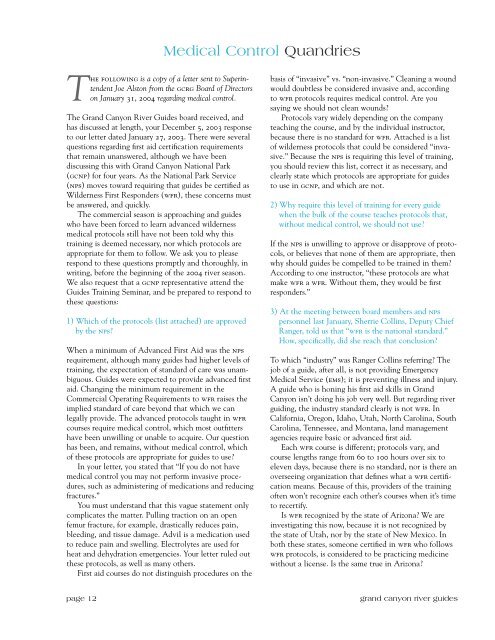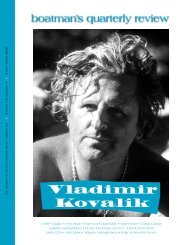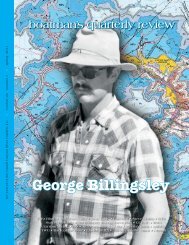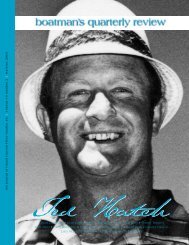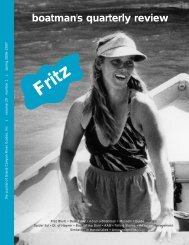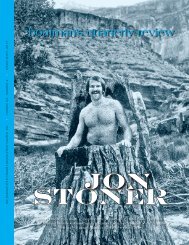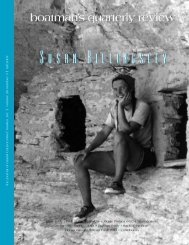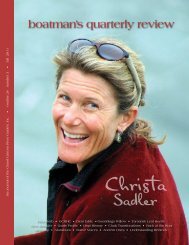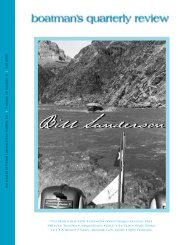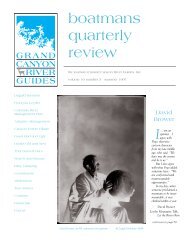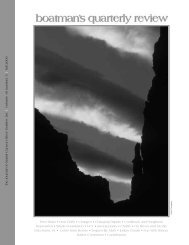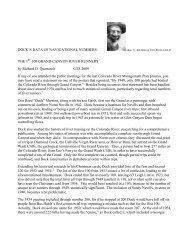spring 04 / 17:1 - Grand Canyon River Guides
spring 04 / 17:1 - Grand Canyon River Guides
spring 04 / 17:1 - Grand Canyon River Guides
Create successful ePaper yourself
Turn your PDF publications into a flip-book with our unique Google optimized e-Paper software.
Medical Control Quandries<br />
The following is a copy of a letter sent to Superintendent<br />
Joe Alston from the gcrg Board of Directors<br />
on January 31, 20<strong>04</strong> regarding medical control.<br />
The <strong>Grand</strong> <strong>Canyon</strong> <strong>River</strong> <strong>Guides</strong> board received, and<br />
has discussed at length, your December 5, 2003 response<br />
to our letter dated January 27, 2003. There were several<br />
questions regarding first aid certification requirements<br />
that remain unanswered, although we have been<br />
discussing this with <strong>Grand</strong> <strong>Canyon</strong> National Park<br />
(gcnp) for four years. As the National Park Service<br />
(nps) moves toward requiring that guides be certified as<br />
Wilderness First Responders (wfr), these concerns must<br />
be answered, and quickly.<br />
The commercial season is approaching and guides<br />
who have been forced to learn advanced wilderness<br />
medical protocols still have not been told why this<br />
training is deemed necessary, nor which protocols are<br />
appropriate for them to follow. We ask you to please<br />
respond to these questions promptly and thoroughly, in<br />
writing, before the beginning of the 20<strong>04</strong> river season.<br />
We also request that a gcnp representative attend the<br />
<strong>Guides</strong> Training Seminar, and be prepared to respond to<br />
these questions:<br />
1) Which of the protocols (list attached) are approved<br />
by the nps<br />
When a minimum of Advanced First Aid was the nps<br />
requirement, although many guides had higher levels of<br />
training, the expectation of standard of care was unambiguous.<br />
<strong>Guides</strong> were expected to provide advanced first<br />
aid. Changing the minimum requirement in the<br />
Commercial Operating Requirements to wfr raises the<br />
implied standard of care beyond that which we can<br />
legally provide. The advanced protocols taught in wfr<br />
courses require medical control, which most outfitters<br />
have been unwilling or unable to acquire. Our question<br />
has been, and remains, without medical control, which<br />
of these protocols are appropriate for guides to use<br />
In your letter, you stated that “If you do not have<br />
medical control you may not perform invasive procedures,<br />
such as administering of medications and reducing<br />
fractures.”<br />
You must understand that this vague statement only<br />
complicates the matter. Pulling traction on an open<br />
femur fracture, for example, drastically reduces pain,<br />
bleeding, and tissue damage. Advil is a medication used<br />
to reduce pain and swelling. Electrolytes are used for<br />
heat and dehydration emergencies. Your letter ruled out<br />
these protocols, as well as many others.<br />
First aid courses do not distinguish procedures on the<br />
basis of “invasive” vs. “non-invasive.” Cleaning a wound<br />
would doubtless be considered invasive and, according<br />
to wfr protocols requires medical control. Are you<br />
saying we should not clean wounds<br />
Protocols vary widely depending on the company<br />
teaching the course, and by the individual instructor,<br />
because there is no standard for wfr. Attached is a list<br />
of wilderness protocols that could be considered “invasive.”<br />
Because the nps is requiring this level of training,<br />
you should review this list, correct it as necessary, and<br />
clearly state which protocols are appropriate for guides<br />
to use in gcnp, and which are not.<br />
2) Why require this level of training for every guide<br />
when the bulk of the course teaches protocols that,<br />
without medical control, we should not use<br />
If the nps is unwilling to approve or disapprove of protocols,<br />
or believes that none of them are appropriate, then<br />
why should guides be compelled to be trained in them<br />
According to one instructor, “these protocols are what<br />
make wfr a wfr. Without them, they would be first<br />
responders.”<br />
3) At the meeting between board members and nps<br />
personnel last January, Sherrie Collins, Deputy Chief<br />
Ranger, told us that “wfr is the national standard.”<br />
How, specifically, did she reach that conclusion<br />
To which “industry” was Ranger Collins referring The<br />
job of a guide, after all, is not providing Emergency<br />
Medical Service (ems); it is preventing illness and injury.<br />
A guide who is honing his first aid skills in <strong>Grand</strong><br />
<strong>Canyon</strong> isn’t doing his job very well. But regarding river<br />
guiding, the industry standard clearly is not wfr. In<br />
California, Oregon, Idaho, Utah, North Carolina, South<br />
Carolina, Tennessee, and Montana, land management<br />
agencies require basic or advanced first aid.<br />
Each wfr course is different; protocols vary, and<br />
course lengths range from 60 to 100 hours over six to<br />
eleven days, because there is no standard, nor is there an<br />
overseeing organization that defines what a wfr certification<br />
means. Because of this, providers of the training<br />
often won’t recognize each other’s courses when it’s time<br />
to recertify.<br />
Is wfr recognized by the state of Arizona We are<br />
investigating this now, because it is not recognized by<br />
the state of Utah, nor by the state of New Mexico. In<br />
both these states, someone certified in wfr who follows<br />
wfr protocols, is considered to be practicing medicine<br />
without a license. Is the same true in Arizona<br />
page 12<br />
grand canyon river guides


